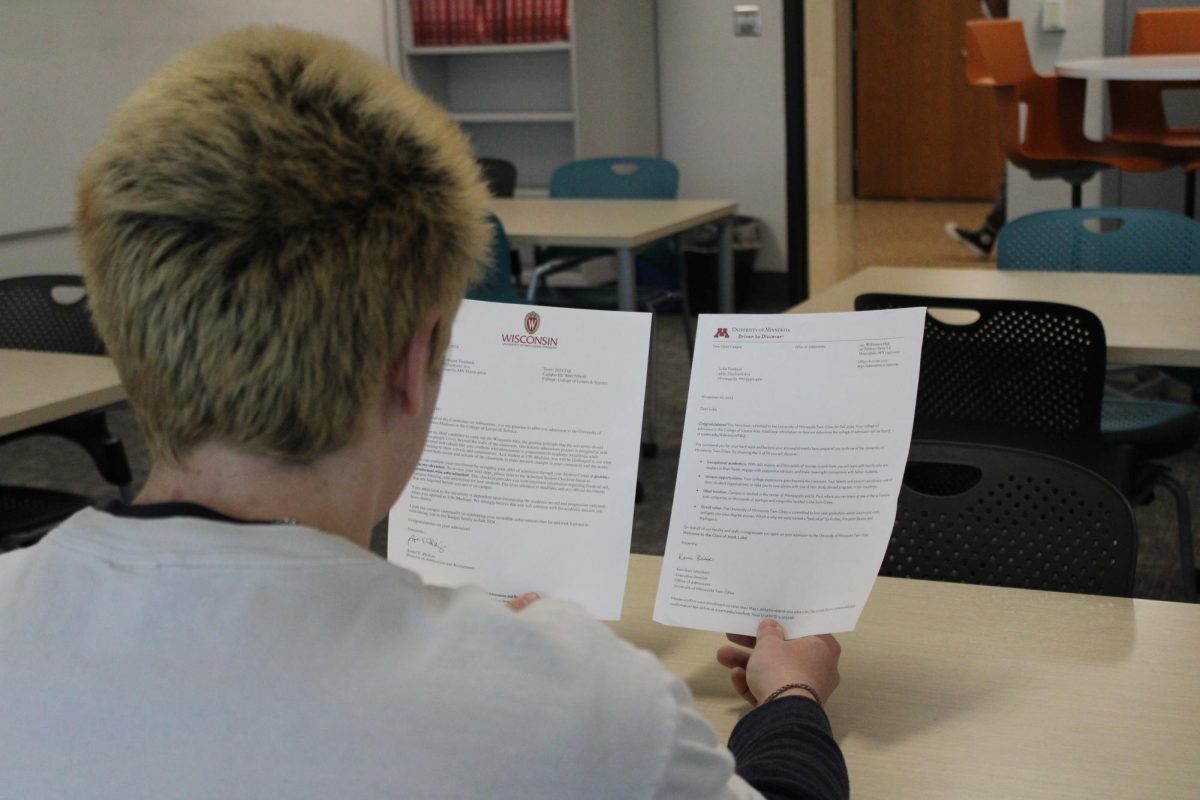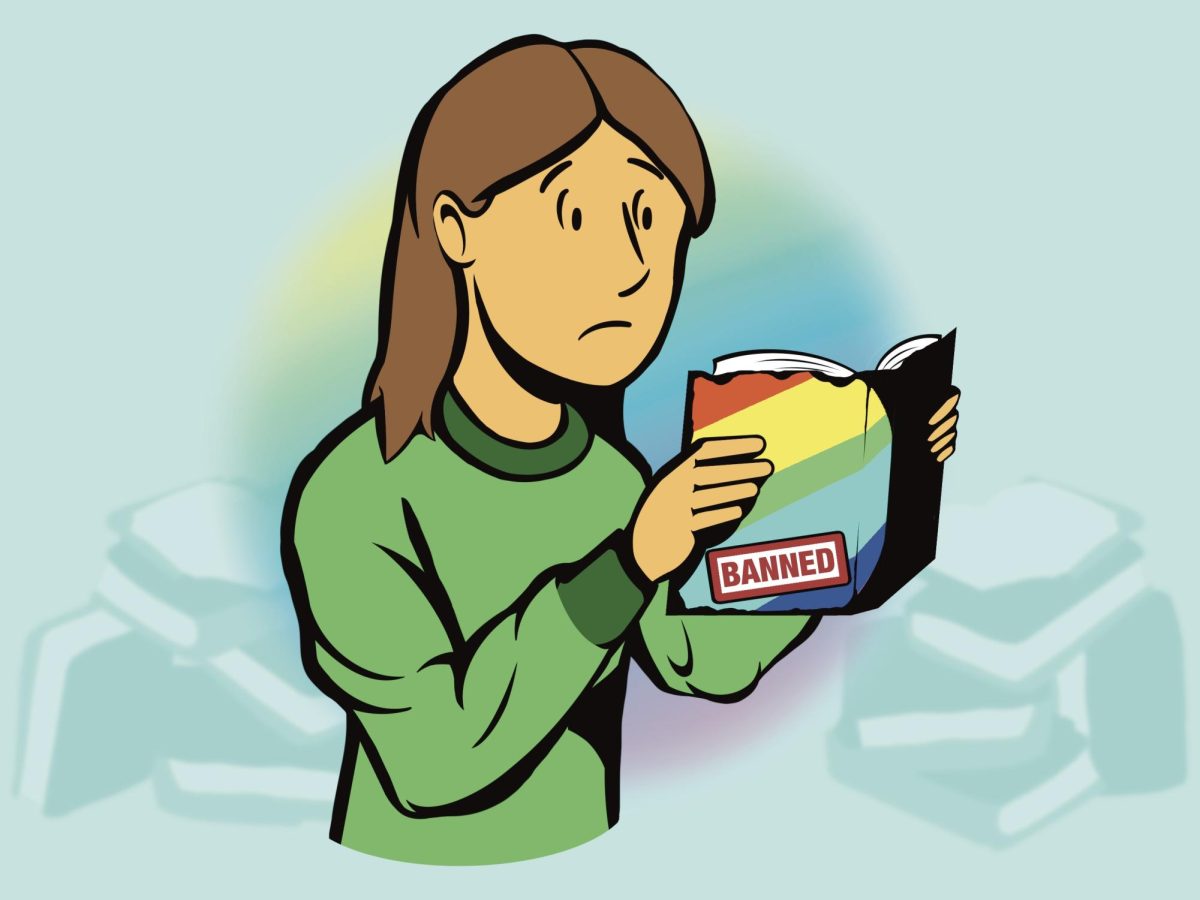Cloudy skies, cloudy eyes
With the start of winter, clouds start covering up the sun, and the mood at Park echoes the outside atmosphere. Park’s school-based therapist Siobhan Fitzgerald said the lack of sunlight in the winter affects chemicals in the brain, causing depressive symptoms that may accompany SAD.
“(There is) this theory that less sunlight is going to affect our circadian rhythm, and less sunlight also affects your serotonin levels, which is a happy hormone,” Fitzgerald said. “So you’re producing less of that, and that’s why they think you have more depressive symptoms. Less sunlight, less serotonin. Usually, you get more melatonin when the sun isn’t out, so that helps you sleep — it makes you tired. When we take away the sun in the winter, then we might all start feeling a little bit more fatigued.”
Senior Jersey Miller said the combination of the bleak winter weather and the stress of finals adds to the depressive effects SAD has on students.
“A combination of the weather being crappy and the extra stress that comes with finals can be very overwhelming,” Miller said. “It probably affects people’s motivation or capacity to be able to do their schoolwork. Then, if you’re not able to stay on top of your schoolwork, that adds more stress and just contributes to the problem. Inside the school, we don’t get a lot of light in general.”
Fitzgerald said SAD could start to impact different aspects of a student’s life, not just schoolwork.
“It would really affect your daily functioning,” Fitzgerald said. “For instance, if you’re a student starting in the fall and you’re feeling good about everything or on top of all of your work and then all of a sudden you’re noticing, ‘I’m just having trouble getting up in the morning,’ ‘I’m having a really hard time focusing and concentrating or getting to school or doing my homework’ or ‘I’m isolating myself, it’s harder to connect with friends,’ that’s going to impact a big chunk of your life. That’s going to have ripple effects.”
Sophomore Lexa Rischall said SAD can be a constant hurdle to overcome in order to function daily.
“It’s an entire segment of time where you don’t feel okay,” Rischall said. “Depression itself is a hindrance to your daily life, so it probably affects (students) greatly, because during that time of the year they can’t function as they normally do.”
Social studies teacher Jill Merkle said the workload of having seven classes a day can detrimentally affect a student going through SAD.
“If you’re dealing with depression, having seven classes a day, seven things to take care of, that already feels overwhelming, but to have (SAD) on top of that seems extremely overwhelming,” Merkle said. “Being fully human is going to be really difficult if you’re dealing with depression. Being yourself, being able to feel and express emotions and all of that. If you’re depressed, you’re not able to be who you want to be all of the time.”
Miller said there’s already a lot that goes into being a student athlete with having to jump from one duty to the other, so SAD might make academics and sports harder to maintain.
“Being a student athlete is a lot to balance,” Miller said. “It’s a lot of energy, where you also have to be putting time into other responsibilities. If you are experiencing SAD and you’re feeling much lower energy, you don’t have as much to give.”
It’s important to note that anyone at Park can be affected by SAD — not just students. Members of the community spoke out about the ways SAD can affect teachers. Physical education and health teacher Kayla Ross said severe SAD symptoms can appear in teachers as much as students.
“Just like students are at school eight hours a day, so are teachers, and (SAD) could make it so that teaching is not as enjoyable or they’re not doing it to the full extent of the energy that they would normally bring. It makes them withdraw from students or other colleagues,” Ross said. “It can be isolation, lack of physical activities — it’s very similar to how it would impact a student. Understanding if a teacher is going through (SAD) — that affects students, so there’s a lot of pressure on teachers too.”
Merkle said being a teacher in a tough mental state would make it harder to maintain a support system for students.
“It’s hard to have bad days as a teacher because you’re in front of students all day long,” Merkle said. “When you’re not in a good place mentally, it can be really challenging to come in every day and be the biggest support for your students that you want to be. That can also take away from their job, their classroom and all of those things as well.”
Senior Tony Rasmussen said SAD can make teachers feel a lack of incentive to teach and connect with students.
“It could affect the teacher by having them not feel motivated to teach a class, and if a teacher did have (SAD), I don’t think they would want to create bonds with their students,” Rasmussen said. “Having a bond with the student is a very big part of teaching. I think they wouldn’t want to answer questions as often or even just engage as much. When you have (SAD), doing stuff outside of your comfort zone becomes a big chore.”
According to Merkle, the energy brought into the classroom and lesson plans could be reduced if the teacher is going through SAD.
“Having (SAD) would make it very difficult to be creative, very difficult to reach out to students and reach out to families,” Merkle said. “It would be really difficult to do a lot of activities you might love to do in classes because you’re just feeling so awful that I imagine it would look a lot more like worksheets and those kinds of things that allow teachers to sit back because of what’s going on for them.”
Ross said teachers serve students’ success in education, so if a teacher is feeling down, it could negatively affect the quality of students’ learning.
“The teaching could change, routines could change. If a teacher is going through (SAD), their energy might not be as high and maybe they’re not teaching the same style that they used to,” Ross said. “Maybe the way they’re educating changes, thus impacting how students learn.”
Members of the Park community shared multiple ways of coping with SAD. Fitzgerald said it’s important to first acknowledge the issue, and then treat it.
“If you don’t know what you’re struggling with, you might just be trying to do it all on your own,” Fitzgerald said. “If you actually know what’s going on, then it’s easier to advocate for yourself. There’s medications too — I would say they’re the same as treating depression — usually it would be an antidepressant or an SSRI that just works with your serotonin levels.”
Rasmussen said it’s important to create a support system and reach out if one is having constant negative feelings.
“Whenever people are having thoughts of harming themselves, that’s the most important time (to reach out),” Rasmussen said. “If you don’t get help at that point, you’re going to feel like there is no one that can help you and that’s not a good mindset, especially if you’re already having those thoughts.”
Rischall said one way they acknowledge their feelings is by focusing on the good in a situation no matter what.
“Taking one day at a time is what helps me when I’m feeling really down,” Rischall said. “I make sure to look for the positive things in life. I’ll always try to find something that I like because the more that I say I like something, the more things I’ll find to like in that thing. It’s a really good habit — I look in the mirror and tell myself I look good.”
Merkle said participating in athletics in the past has helped pull her out of isolation and produce more endorphins, and may help others.
“I will say that a lot of the time (SAD) can also be lumped with not working out or not getting the exercise that your body craves and that’s great endorphins and great community,” Merkle said. “If you’re dealing with that, being involved in athletics is maybe something that would be helpful to pull out of that a little bit. Not that it’s that simple, but having that in the past for me has been helpful.”
Fitzgerald said nutrition, sleep and connections can help curb the symptoms of SAD.
“Please make sure you are getting enough sleep and eating because that’ll affect your mood big-time,” Fitzgerald said. “Social connections — talk to somebody. Don’t live alone with just experiencing those symptoms. There’s other people out there who are also struggling. You are not alone, and you deserve help too.”
If you are experiencing symptoms of Seasonal Depressive Disorder, contact your healthcare provider or reach out to a trusted adult. Call or text the 988 Suicide and Crisis Lifeline for support.










